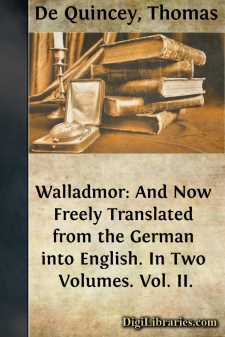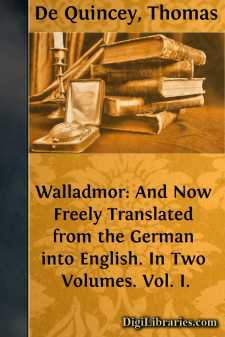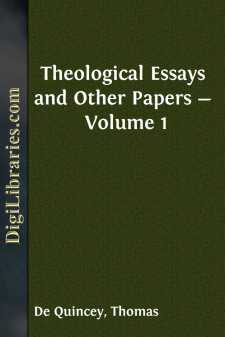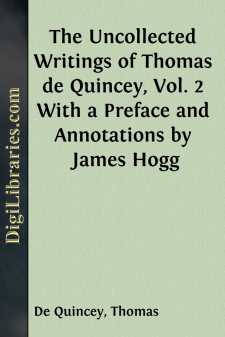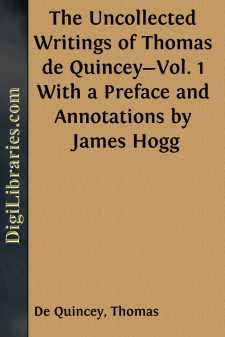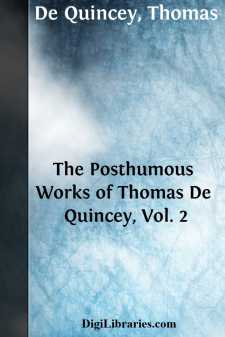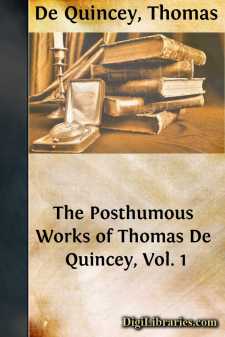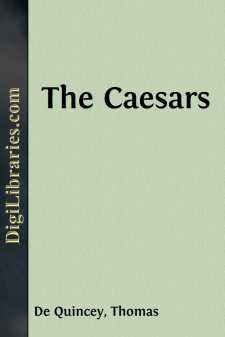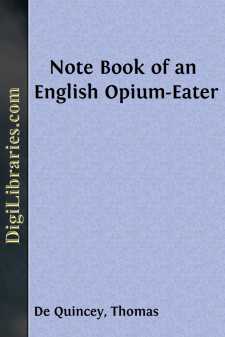Categories
- Antiques & Collectibles 13
- Architecture 36
- Art 48
- Bibles 22
- Biography & Autobiography 813
- Body, Mind & Spirit 142
- Business & Economics 28
- Children's Books 13
- Children's Fiction 10
- Computers 4
- Cooking 94
- Crafts & Hobbies 4
- Drama 346
- Education 46
- Family & Relationships 57
- Fiction 11828
- Games 19
- Gardening 17
- Health & Fitness 34
- History 1377
- House & Home 1
- Humor 147
- Juvenile Fiction 1873
- Juvenile Nonfiction 202
- Language Arts & Disciplines 88
- Law 16
- Literary Collections 686
- Literary Criticism 179
- Mathematics 13
- Medical 41
- Music 40
- Nature 179
- Non-Classifiable 1768
- Performing Arts 7
- Periodicals 1453
- Philosophy 64
- Photography 2
- Poetry 896
- Political Science 203
- Psychology 42
- Reference 154
- Religion 513
- Science 126
- Self-Help 84
- Social Science 81
- Sports & Recreation 34
- Study Aids 3
- Technology & Engineering 59
- Transportation 23
- Travel 463
- True Crime 29
Thomas De Quincey
Thomas De Quincey (1785-1859) was an English essayist best known for his autobiographical work, "Confessions of an English Opium-Eater," which explores his experiences with opium addiction and its impact on his life and work. A key figure in the Romantic movement, De Quincey's writings combine rich, lyrical prose with keen psychological insight. His contributions to literature also include critical essays and works on philosophy and political economy, influencing both his contemporaries and later writers.
Author's Books:
Sort by:
Hast thou a medicine to restore my wits When I have lost them?--If not, leave to talk. Beaumont and Fletcher; Philaster. In this perplexity, whilst sitting down to clear up his thoughts and to consider of his future motions, Bertram suddenly remembered that immediately before the attack on the revenue officers, a note had been put into his hand--which he had at that time neglected to read under the...
more...
The following novel was originally produced in the German language, as a soi disant translation from Sir Walter Scott, to meet the demands of the last Easter fair at Leipsic. In Germany, from the extreme difficulties and slowness of communication between remote parts of the country, it would be altogether impossible to effect the publication of books, upon the vast scale of the current German...
more...
ON CHRISTIANITY, AS AN ORGAN OF POLITICAL MOVEMENT. [1846.] FORCES, which are illimitable in their compass of effect, are often, for the same reason, obscure and untraceable in the steps of their movement. Growth, for instance, animal or vegetable, what eye can arrest its eternal increments? The hour-hand of a watch, who can detect the separate fluxions of its advance? Judging by the past, and the...
more...
THE ENGLISH IN CHINA. This Paper, originally written for me in 1857, and published in Titan for July of that year, has not appeared in any collective edition of the author's works, British or American. It was his closing contribution to a series of three articles concerning Chinese affairs; prepared when our troubles with that Empire seemed to render war imminent. The first two were given in Titan...
more...
PREFACE. 'The last fruit off an old tree!' This, in the words of Walter Savage Landor, is what I have now the honour to set before the public in these hitherto 'Uncollected Writings of Thomas De Quincey.' It was my privilege to be associated intimately with the Author some thirty to forty years ago—from the beginning of 1850 until his death in 1859. Throughout the whole period...
more...
INTRODUCTION. All that needs to be said in the way of introduction to this volume will best take the form of notes on the articles which it contains. I. 'Conversation and S. T. Coleridge.' This article, which was found in a tolerably complete condition, may be regarded as an attempt to deal with the subject in a more critical and searching, and at the same time more sympathetic and inclusive...
more...
GENERAL INTRODUCTION. These articles recovered from the MSS. of De Quincey will, the Editor believes, be found of substantive value. In some cases they throw fresh light on his opinions and ways of thinking; in other cases they deal with topics which are not touched at all in his collected works: and certainly, when read alongside the writings with which the public is already familiar, will give...
more...
INTRODUCTION I. LIFE Thomas de Quincey was born in Manchester on the 15th of August, 1785. His father was a man of high character and great taste for literature as well as a successful man of business; he died, most unfortunately, when Thomas was quite young. Very soon after our author's birth the family removed to The Farm, and later to Greenhay, a larger country place near Manchester. In 1796 De...
more...
THE CÆSARS. The condition of the Roman Emperors has never yet been fully appreciated; nor has it been sufficiently perceived in what respects it was absolutely unique. There was but one Rome: no other city, as we are satisfied by the collation of many facts, either of ancient or modern times, has ever rivalled this astonishing metropolis in the grandeur of magnitude; and not many—if we except the...
more...
A SEQUEL TO 'MURDER CONSIDERED AS ONE OF THE FINE ARTS.' [1] [1854.] It is impossible to conciliate readers of so saturnine and gloomy a class, that they cannot enter with genial sympathy into any gaiety whatever, but, least of all, when the gaiety trespasses a little into the province of the extravagant. In such a case, not to sympathize is not to understand; and the playfulness, which is...
more...


